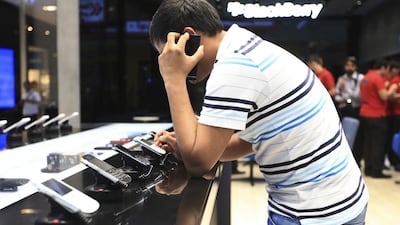Last week, when I had to fly to New York from Los Angeles, I was at the terminal gate with several very important people.
I know they were important because all of them were barking orders into their smartphones.
One was talking on his phone and, at the same time, typing something into it.
Another was striding around in a zigzag pattern while talking sharply into the microphone.
A third had his laptop out and kept shouting into his phone: “Did you get it yet? I just sent it. Did you get it yet? I just sent it.”
It was a remarkable display of efficient business communication. I have no idea how they managed it.
For me, the phone is an endless source of productivity-killing distraction.
The best way to reach me is to text me. Or, if that doesn’t work, you can send me an email on any of my four email addresses.
You can also send me a direct message on Twitter or send me an Instagram message.
I’m also on Facebook, About Me and LinkedIn.
In addition, I get a lot of messages on Slack – an enterprise messaging service that’s very popular – but you have to be part of a company I’m involved with.
And, worse comes to worst, you can Snapchat at me.
There are, officially, 14 ways to interrupt me – 15 if you use a mobile phone for its original purpose and call me.
Practically anyone can burst into my life when I’m doing whatever it is that I’m supposed to be doing – what, in other words, I’m being paid to do – which is mostly write stuff, read stuff or produce stuff, or talk about stuff I’m writing or reading or producing.
I’m not complaining.
I like the interruptions because – and I’m sure there’s a nicer way to put this – I’m lazy and would prefer to do 5,000 easy small things than one big hard thing, even though (and this is crucial) the first rule of economics is that you only really get paid for the hard stuff.
I know what you’re asking. You’re asking how do you get anything done?
To which the answer is: I don’t get anything done.
That’s not strictly true, of course. But even when I’m working I find modern communications inefficient.
Here’s how it works for me: most of the time I get an email from someone at a studio or television network arranging a conference call, and I respond that I got the message and will be on the call.
Inevitably, another person also on the call then sends an email using the truly diabolical “reply-to-all” function – something like: “I’ll be there! Thanks for arranging this!” and pretty soon there are five or six emails about the same thing, including one that’s just a “thanks!” followed by a “no problem” – often written as simply “NP” – and then someone wraps it up with a “happy face” emoticon, which inspires someone else to reply-to-all a one-line “LOL”.
When the call actually starts and I’m trying to join it with the access code, I’ll often get a text from someone’s assistant – an entirely new mode of communication snuck in there at the last minute – saying something along the lines of: “We’re all on. Ready anytime.”
And then after the call everyone texts or emails – or texts and emails, for some reason – to set up a call to talk about what happened on the call.
Somehow, other people, with roughly the same amount of daily electronic interruptions, are much more productive. And I don’t just mean airport show-offs.
Earlier this year, as a cascade of private email messages among executives of Sony Pictures were stolen and released, what amazed me was the sheer volume of them.
Judging from the size of the files and the frequency of the messages, it seems as if the executives at Sony did nothing but tend to their emails and texts.
And yet during that time the studio managed to produce, finance and distribute a huge number of films and television shows.
Former US secretary of state Hillary Clinton, whose emails are now being pored over by hungry journalists and suspicious investigators, seems to have been up to very little other than checking her inbox, despite representing a large and complicated country in its dealings worldwide.
Mrs Clinton boasts that she has spent half of the past eight years travelling the world on urgent diplomatic business. Judging from her email traffic, she spent the other half on her phone.
The difference between me and the truly productive was brought home as I boarded the plane to New York.
The guys on the phones – still talking loudly, still barking out orders – were a few steps ahead of me.
But as we boarded the plane, they each turned left, to the expensive seats in first class.
I turned right, to the economy plus cabin.
Someone clearly knows what the smartphone was invented for.
Rob Long is a writer and producer in Hollywood

